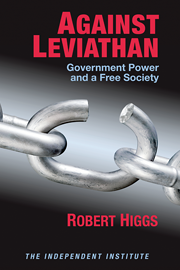Ross Perot thinks America needs a third party to stop the government from doing business as usual. But Republicans tell us that they are carrying out a revolution right now, and howls from the Democrats seem to confirm that the Republicans really are on a rampage. But does Capitol Hill rhetoric reflect reality, or is the Republican revolution a dud?
Two photos published recently in the New York Times eloquently suggest why reform-minded voters may seek a third party next year. In one scene, Washington Mayor Marion Barry and House Speaker Newt Gingrich sit shoulder to shoulder, smiling warmly, in the other they appear similarly serious. Viewing these political bookends -- the mountebank mayor and the leader of the Republican revolution -- one cannot but wonder: Is this revolution for real?
Soon after the 1994 election, reasons to doubt the sincerity of the radical Republicans began to appear. Elected on an antistatist platform, Rep. Linda Smith (R-WA) changed her tune when presented with a proposal to privatize the Bonneville Power Administration, which supplies cheap subsidized electricity to her district. She did not intend to jeopardize her constituents’ jobs, she explained. Such opportunism typifies Republican behavior in countless congressional districts across America. If this be Republican radicalism, then the political status quo is safe.
Despite the hoopla, the Contract with America has scarcely reined in big government. Congress has enacted no balanced-budget amendment, no line-item veto, no welfare reform, no relief from suffocating regulations, no term-limits amendment, no tort law reform, no restraints on the group preferences known as affirmative action. And despite the excitement over the House’s passage of the GOP Medicare reform bill, the Republican measure merely trims the spending increases planned by the Democrats. Except for passing a foggy limitation on certain unfunded mandates, Congress has little to show for all its huffing and puffing. Plans to eliminate the cabinet departments of Education, Commerce, and Housing and Urban Affairs have been derailed. Congress has failed to abolish even such highly unpopular agencies as the National Endowment for the Arts and such subsidy sinkholes as the Corporation for Public Broadcasting.
The GOP budget plan calls for gradually eliminating the deficit over seven years while government spending continues to grow. Although it is hardly revolutionary, the Republicans may yet compromise their budget to death. Says House Budget Committee Chairman John Kasich, "My nightmare scenario is we will all wink at one another across the table and that we’ll sell the American people a pig in a poke and walk away and not have changed anything."
Why, unlike the frenetic Congress of 1933 with its famous hundred days of landmark legislation, has the current Congress accomplished so little? The short answer is money. The long answer is organized interest groups and money. According to a study of Federal Election Commission records by Common Cause, the 85 House freshmen in the first half of 1995 raised $11 million for next year’s campaigns, and 45 percent of the money came from PACs. The House as a whole raised almost $44 million, an all-time record and 38 percent more than incumbents raised during the comparable period in 1993. Republicans received about 63 percent of the total. As the majority, House Republicans are getting more than twice what they got in the minority. Gingrich led all Republican fundraisers with $884,897, trailing only Dick Gephardt, who took in $1,218,922. Call these contributions what you will -- bribes or payments for "access" -- only an imbecile would think that interest groups give millions to politicians without expecting anything in return. So the American Association of Retired Persons buys continuation of the soon-to-be-bankrupt pension and Medicare systems, the trial lawyers fend off tort reform, the National Education Association props up the Department of Education, the military-industrial complex keeps defense funds flowing as if the Cold War had never ended. Welcome to yesterday.
Some seventy years ago, H. L. Mencken wrote, "politics, under democracy, resolves itself into impossible alternatives. Whatever the label on the parties, or the war cries issuing from the demagogues who lead them, the practical choice is between the plutocracy on the one side and a rabble of preposterous impossibilities on the other." This description still applies, but now far more money is thrown around to sway elections and pay off those elected. More than ever, the special interests thrive and the public interest gets only lip service.
"What [democracy] needs beyond everything," Mencken wrote, "is a party of liberty." Today the harshly regulated and heavily taxed public still needs such a party, and clearly neither the Democratic nor the Republican is it. Unfortunately, Perot’s new party, with its backward-looking protectionist inclinations, will also have little to offer the long-suffering electorate. But the rise of a reform-oriented third party may mean that frustrated voters grasp that safeguarding liberty requires loyalty to principle, not short-run opportunism or apple-pie appeasement. Unfortunately, many Republican politicians -- royalists speaking revolutionary rhetoric -- just don’t get it.



















